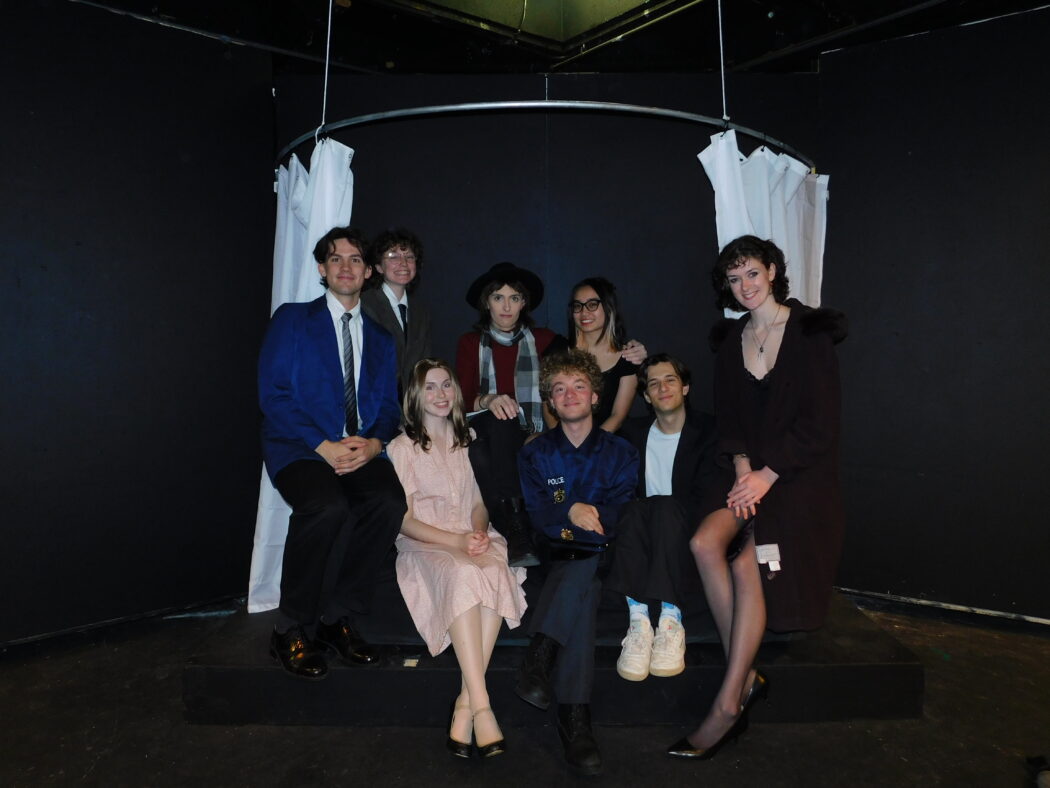The Bull & Bear’s Arismita Ghosh reviews a recent student production of What The Butler Saw presented by the Player’s Theatre
I entered the McGill Players’ Theatre to watch Carmen Mancuso’s production of What The Butler Saw with little to no prior knowledge of the play itself, which is arguably the best possible way to have experienced it. The performance that followed can only be described as perfectly perverse in its execution, drawing laughs and scandalous gasps alike from the audience as the story unfolded onstage. Each twist and turn was punctuated with punchy dialogue and dynamic acting from each of the cast members, making for an entirely memorable production.
The play begins with our protagonist, Dr. Prentice (Will Barry), conducting a standard interview for the position of his new secretary, Geraldine (Molly Frost). Things soon take a turn for the unexpected when the interview turns into an ill-executed attempt from Prentice to seduce Geraldine, spiraling into a web of lies as he comes up with ways to hide this dalliance from his wife (Claire Tees). The plot thickens when we find out Mrs. Prentice herself is trying to cover up an affair with Nicholas Beckett (Adam Zanin), the bellhop from the night before, paired with the surprise arrival of two other characters: Dr. Rance (Molly McKenzie), here to inspect Dr. Prentice’s clinic, and Sergeant Match (Henry Kemeny-Woflinger), on the hunt for a missing part from Churchill’s statue. Clothes are shed and traded, marble penises are lost and found again, and any remaining sense of sanity is quickly abandoned.
The end result leaves the audience with barely any breathing room between laughs, pulling off the farce genre flawlessly.
From the first minute we spend with the characters, it is evident that this is no regular play poking fun at twentieth-century British bourgeoisie. Under the fast-paced direction of Carmen Mancuso, dialogue is delivered with no room to think twice about any sentence. The jokes land with perfect timing, every word hitting like a sucker punch. The end result leaves the audience with barely any breathing room between laughs, pulling off the farce genre flawlessly.
Each of the actors embodies their characters like a second skin, enabling the audience members to lose themselves completely in the insanity unfolding onstage. Geraldine is perfectly mousy and naive, standing in stark contrast to the smoky and flirtatious Mrs. Prentice. The caricaturesque Sergeant Match adds an extra layer of humour to the character through his physicality, moving like the stock cartoon version of a policeman. He even walks between the theatre seats at one point, breaking the fourth wall and engaging the audience directly in the action. Dr. Rance’s slow descent into hysteria by the end of the second act is what stole the show for me, wrapping up the entire play’s madness with a cherry on top.
Although it is easy to watch a modern-day production of What The Butler Saw, laugh for two hours, and then simply dismiss it as a historical comedy, that is the opposite of what this play asks of its audience. As Mancuso writes in the program notes, the way in which we use and abuse power structures has largely stayed the same over the years. The play’s conversation about gender feels especially timely, echoing back to an era when transgender identities were still seen as psychological disorders. The Union for Gender Empowerment at McGill recently held a Trans Day of Remembrance event for participants to channel and express their rage against these kinds of transphobic systems. Mancuso’s production of What The Butler Saw presents itself as a way of satirising and consequently condemning the power structures that put these ideas in place, using the power of comedy to poke fun at its problematic characters.
What The Butler Saw is a prime example of how we can laugh our asses off, keep learning from history, and cause ripples in what we accept as the status quo.
Humour has long since been a medium for change in our societies. From the time in which Joe Orton first wrote this play, to the time in which it is being performed for modern-day audiences in 2022, the use of comedy as a political tool has remained the same. What The Butler Saw is a prime example of how we can laugh our asses off, keep learning from history, and cause ripples in what we accept as the status quo.








